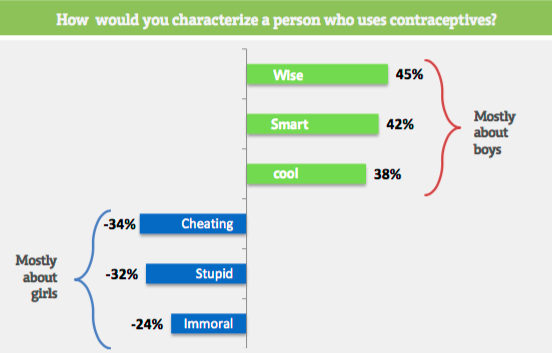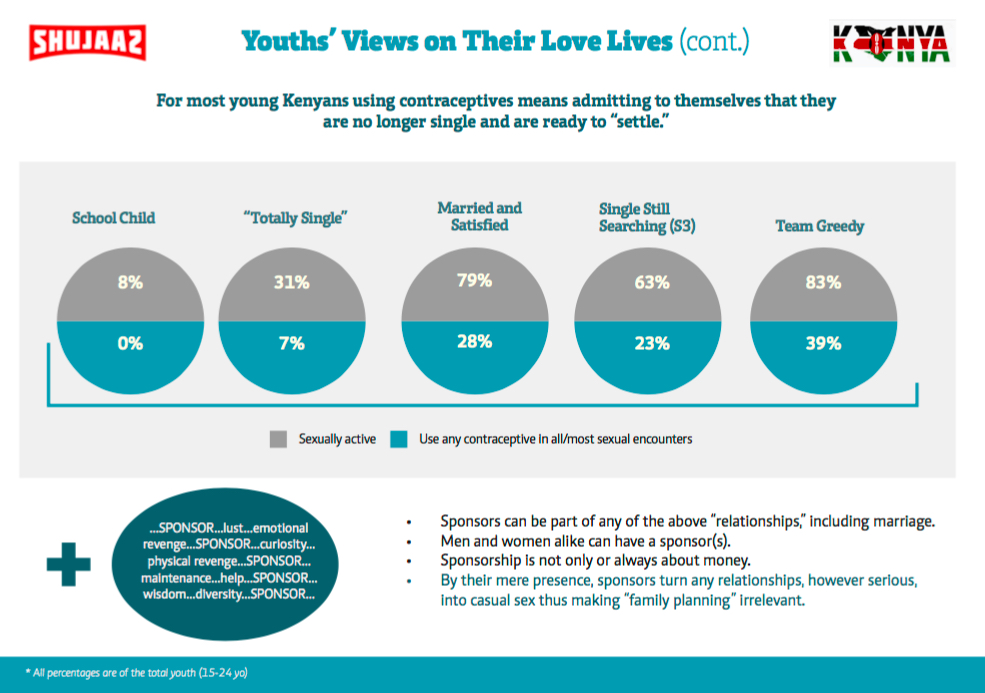Teenage girls in Kenya are having sex with men they call “sponsors” to pay for desirable items including jeans, mobile phones and internet credit.
They are also reluctant to use condoms in case people assume they are prostitutes or label them “cheaters,” according to new research by the makers of Shujaaz, Kenya’s best-known comic book.
One in three people aged 15 to 24 interviewed for the report said they had or knew someone who had a sponsor. Most people thought it was okay to have a sponsor, even if that person is in another relationship.
The report, published this month, shines new light on the way young people in Kenya see themselves and the sexual activities they are engaging in.
“There’s a lot of secrecy in Kenya around sex and relationships,” says Bridget Deacon, programming director of Well Told Story, who produced the research.
Teenage girls in particular are revealed to be vulnerable because they don’t want to appear promiscuous, even if they are regularly sleeping with different people.
“Girls are very aware of the kind of virtuous or ‘well-behaved’ women men want to marry and they aspire to that model,” says Deacon. “Contraception is a real glitch in this narrative. They might be having casual sex with a guy for fun on the weekend or sleeping with an older man to get something they need, but the minute they use contraception they are admitting to themselves they are having sex out of a relationship.”
While 31 percent of those interviewed said they were single and sexually active, only 7 percent of those single people said they use contraception every time they have sex.
Respondents said it was okay for men to carry a condom “just in case” because men often have sex without planning. However, women were said to always plan sex in advance. So if a girl carries a condom it makes her come across as immoral, or worse, a cheater.
Interviews were carried out by young Kenyans themselves, who were trained in research-gathering techniques to encourage their peers to talk openly.
Respondents described the different kinds of lovers they encounter using Sheng, a Kenyan street language made up of Swahili and English.
Team Hyena are people on the prowl for new sexual encounters; a Tom and Jerry is someone in a complicated long-distance relationship; while an S3 is someone who is single and still searching for the right partner. The most desirable girls are known as Dame90s because they can make men wait 90 days before going to bed.

While the dating scene among Kenyan teens seems comparable to that of many other young people around the world, the fact that some girls and boys are willing to exchange sex for things they need or want is perhaps explained by the findings that only 4 percent said they had enough money to cover their daily needs.
“We’re not trying to be judgmental,” says Deacon. “The reality is, adolescents all over the world are sexually active. We just want to understand the nuances better so we’re better able to provoke a healthy conversation about relationships, sex.”
Kenya has 8.4 million 15- to 24-year-olds, who account for one fifth of the population.
There have been some improvements to sexual and reproductive health in recent years, thanks to investment from the government and international partners. A recent Demographic Health Survey found over half of married women are using some form of contraception, with 60 percent of users obtaining them from government health facilities.
However, adolescent girls, says Deacon, are falling through the gaps. One in five girls get pregnant before they reach 20, with serious consequences for their educational, economic and personal growth.
“We need organizations to come together and look at this problem with a 360-degree approach,” says Deacon.

To better understand why girls are not accessing family planning services, Well Told Story sent out two of its young members of staff to act as “mystery shoppers,” posing as 17-year-olds seeking advice on contraception from public and private clinics around the country.
While some of the facilities offered a private and safe space for teenagers to explore contraception options, many revealed a serious lack of privacy.
In one place, the researcher got pre-contraception counseling in a room full of other patients. In another, the receptionist shouted the researcher’s contraceptive needs to a colleague so everyone in the room could hear. When one of the researchers told a male doctor she was 17 and just about to finish school, he asked for her phone number and her Facebook account name.
They also found older women at clinics offered unsolicited and, at times, inaccurate advice on different types of contraception, and information pamphlets were hard to find or never restocked.
“It flags up a concerning reality that both service providers and Shujaaz need to take into account,” says Deacon. “How can we encourage our audience to visit a clinic if we know we are sending them into an unpredictable, precarious environment?”
